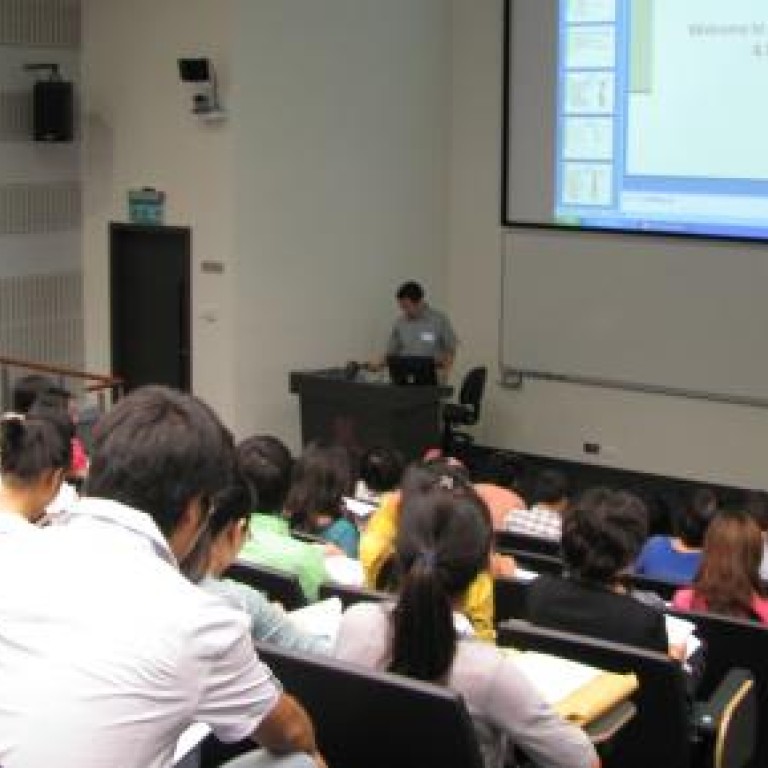
Berserk for Buns: We Try Out The 10 Most Unusual Burgers in Hong Kong
From Hainanese chicken to ramen to deep-fried cuttlefish, these are some of the most bizarre burgers in town.
Just a cursory glance at the jobs pages is enough to confirm the increasing importance placed on language skills in today's employment market. And when it comes to the level of those the skills required, the bar seems to be rising.
"Nowadays, higher education is crucial to upgrading the economy," says Professor Thomas Lee Hun-tak, head of the division of linguistics at the Chinese University of Hong Kong (CUHK).
"People from various industries expect their employees to have master's degrees. For instance, secondary schools and high schools in mainland China and in Hong Kong now expect teachers to possess a master's degree," he adds.
"It is not adequate just to have a bachelor's from a first-tier university. This has increased the pressure for teachers to receive higher education so they can stay on in their jobs," he says.
Lee believes that the postgraduate programmes run by his department at CUHK can help open the door to a very broad range of careers.
"With solid training in linguistics and a wide exposure to diverse disciplines, our graduates are in a strong position to pursue careers [in various fields]," Lee says, citing language education, business and public administration, interpretation and translation, journalism, other media and communication-related services, computer language processing and language engineering research, speech therapy, as well as brain and cognitive sciences research.
CUHK offers a master's in linguistics, a master's in Chinese linguistics and language acquisition, as well as an MPhil-PhD articulated programme in linguistics. "Our programmes emphasise the study of linguistic theories, as well as the integration of theoretical study with issues of language structure, language use and language acquisition, in particular those relevant to the local community and the Asian-Pacific region," says Lee.
And CUHK's approach has proved attractive to potential applicants. "The demand is very high. For the research postgraduate programmes, we received around 100 applications in the last academic year. For the two master's programmes, we received roughly 500 applications," says Lee.
This does not surprise Lancy Chui, managing director of global recruitment firm ManpowerGroup's Hong Kong, Macau and Vietnam Operations. "To stay ahead in the changing world of work, candidates are more willing to invest time and money in enhancing their qualifications," she says.
CUHK's masters' in linguistics and in Chinese linguistics and language can be pursued as either one-year full-time or two-year part-time programmes. Both are offered mainly in the evening and consist of two hours of lectures, and one hour of tutorials per course each week.
"The master's in linguistics programme is designed to introduce students to current theories in linguistics and their various applications," says Lee.
He cites the areas of language typology, language acquisition, language and modality, language teaching and culture and society.
This programme consists of three streams - general linguistics, language acquisition and bilingualism, and sign linguistics. To graduate, students are required to complete 24 units of courses. The fee for the master's in linguistics is HK$79,200 a year for full-time students, and HK$39,600 for part-time basis.
Lee says that the master's in Chinese linguistics and language acquisition was established in response to the growing global demand for the teaching and learning of Chinese.
To graduate from this programme, students are required to complete 27 units of courses, including 15 units of required courses and 12 units of electives.
The annual cost for full-time students on the master's in Chinese linguistics and language acquisition programme is HK$89,100 compared with HK$44,550 for part-time students.
For those master's graduates who wish to pursue their studies at a higher level, CUHK's MPhil-PhD articulated programme in linguistics trains research students to carry out original research.
"Graduates typically pursue higher-level research training, or apply for post-doctoral fellowships, or take up teaching posts in tertiary institutions or positions at research institutes," Lee says.
The courses for research postgraduate programmes consist of lectures and seminars mostly offered during the day.
Students in the MPhil stream are required to complete a total of 15 units. In addition, students must take nine units on a third language, and register for a thesis research course each term.
For the PhD stream, students are required to complete a total of 22 units. Again, they also need to take six units of advanced courses in a third language and register for a thesis research course each term.
The cost for those following either the MPhil or PhD programme on full-time is HK$42,100 a year. While part-time students in the PhD stream pay HK$51,000 and those in the MPhil stream pay HK$45,560.
